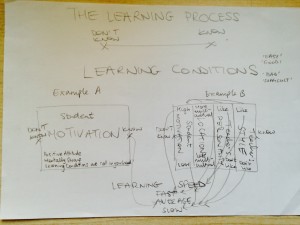Background
One evening I spoke with a friend about a theory I had about the ‘newness’ of the Chinese language being learned on an international scale and the lack of experience of native Chinese speakers listening to non-natives speaking their language. My theory goes that a lack of experience on the side of the native Chinese listener, means an additional strain on the learner’s ability to be understood, and thus increases anxiety. Comparatively, due to the ubiquitousness of the English language, and, although dependent on various factors including location, one might infer a certain ‘experience’ on the listener’s part to exert some effort to understand what is being said. This would thus, decrease anxiety. In a nutshell, my friend, completely disagreed. She claimed a positive attitude and mental strength could overcome any such foreign language anxiety noted above. And that it was, “All in my head!”
That night, I tossed and turned. And eventually, got up, some time around dawn, to scribble down my thoughts on four A4 pages. The first of which is shown above. I will attempt to draw out the main points below.
The Learning Process and Learning Conditions
Although I drew the learning process as a straight line, starting from a point of “not knowing”, eventually ending at “knowing”, this was done more for visual simplicity, than to say I see learing as a linear process. (Indeed, check out my post here about how I visualise my Personal Learning Environment, where I see learning as far from linear).
According to Krashen (1985a, 1985b), “…anxiety inhibits the learner’s ability to process incoming language and shirt-circuits the process of (language) acquisition.” So I put forward the idea in my sketch, that the presence of certain conditions contribute to an ‘easier/better/quicker’ learning experience, and that the converse of those make learning ‘harder/more difficult/slower’.
In Example A, the student is not affected by external influences. In order to move swiftly from not knowing to knowing, all is needed is a Positive Mental Attitude. My stance is that external influences do shape your learning, so, with motivation alone, the student’s ‘learning speed’ would be about ‘average’.
In Example B, the student is affected by both internal and external influences. Not only is intrinsic motivation important, but also the role of the teacher, in terms of their personality or teaching style, as well as perhaps the geographical location (immersive target language environment).
Anxiety and the Learning Process
My doodles on this topic are me processing whether or not things that happen to you are ‘real’ or a perception of reality. The conclusion is that if you think it happened, then that affects you. Now, each individual person may deal with the above situation in different ways. My friend, who seems quite headstrong, seemingly would not be put off by not being understood. But not everyone is as mentally strong as her, and may be affected by the lack of sensitivity.
As a teacher, I need to be aware that both student A and student B exist, that each comes to class with their own history of learning experiences, which contributes to their current mental attitude to learning (high/low motivation in my sketch). Certainly, von Worde’s research in Student’s Perspectives on Foreign Language Anxiety divulges “…how vivid and explicit memories of painful or exasperating (language learning) situations were…” (von Worde, 2003: 4). To follow on, “Some of these negative experiences originated in hight school classes, and for many this emotional baggage seemed to intrude into their current study.” (von Worde, 2003: 4) These experiences may or may not be ‘real’, but the perceived reality means that they do affect learning. And thus, for me, as a teacher thinking deeply about influencing motivation and self-esteem, is paramount. And my priorities for an anxiety-free learning experience can be found here.
Reflections on how DTLT/the course readings are shaping my future
In my final notes, I attempt to bring together my personal learning from the past two weeks’ of readings (the role of the teacher & the role of anxiety in language learning), rationalise my own practice in relation to these concepts and to speculate on which aspects of my language teaching/learning I may want to develop in the near future.
(i) In order to teach effectively, I need to know my students. In particular knowing their learning style and being aware of past negative language learning experiences would help me to design lessons that appeal to their learning strengths in an environment tailored to reduce their affective filter (Krashen, 1982).
(ii) It seems I am very interested in the psychology of learning, knowing the factors that can move a student from low to high motivation, and from low to fast ‘learning speed’. I’m interested in ensuring students have a positive mental attitude to (language) learning. Perhaps I’d like to be a coach in the future. Perhaps I need to work on my leadership skills or look more into Intercultural Competence.
(iii) This completely organic post (it occurred to me in the middle of the night!) has got me re-visiting the reasons for doing this course. If I remember correctly, it stems from a strong desire to confirm or deny very fixed notions about what language learning is. Indeed, being on this course, I hope to concurrently improve my teaching ability and attitude as a learner.
Am I there yet? I think it’s too early to tell!
References
Krashen, S.D. (1985a). Applications of psycholinguistic research to the classroom. In C. James (Ed.) Practical applications of research in foreign language teaching (pp.51-66). Lincolnwood, IL: National Textbook Co.
Krashen, S.D. (1985b). The input hypothesis: issues and implications. New York: Longman
Krashen, S. (1982). Principles and practice in second language acquisition. Oxford: Pergamon Press
Van Woorde, 2003, Students’ perspectives on Foreign Language Anxiety. Inquiry, 8, 1



2 Comments on “(MA) DTLT – Week 9 – A Sleepless Night: Foreign Language Anxiety”
Comments are closed.